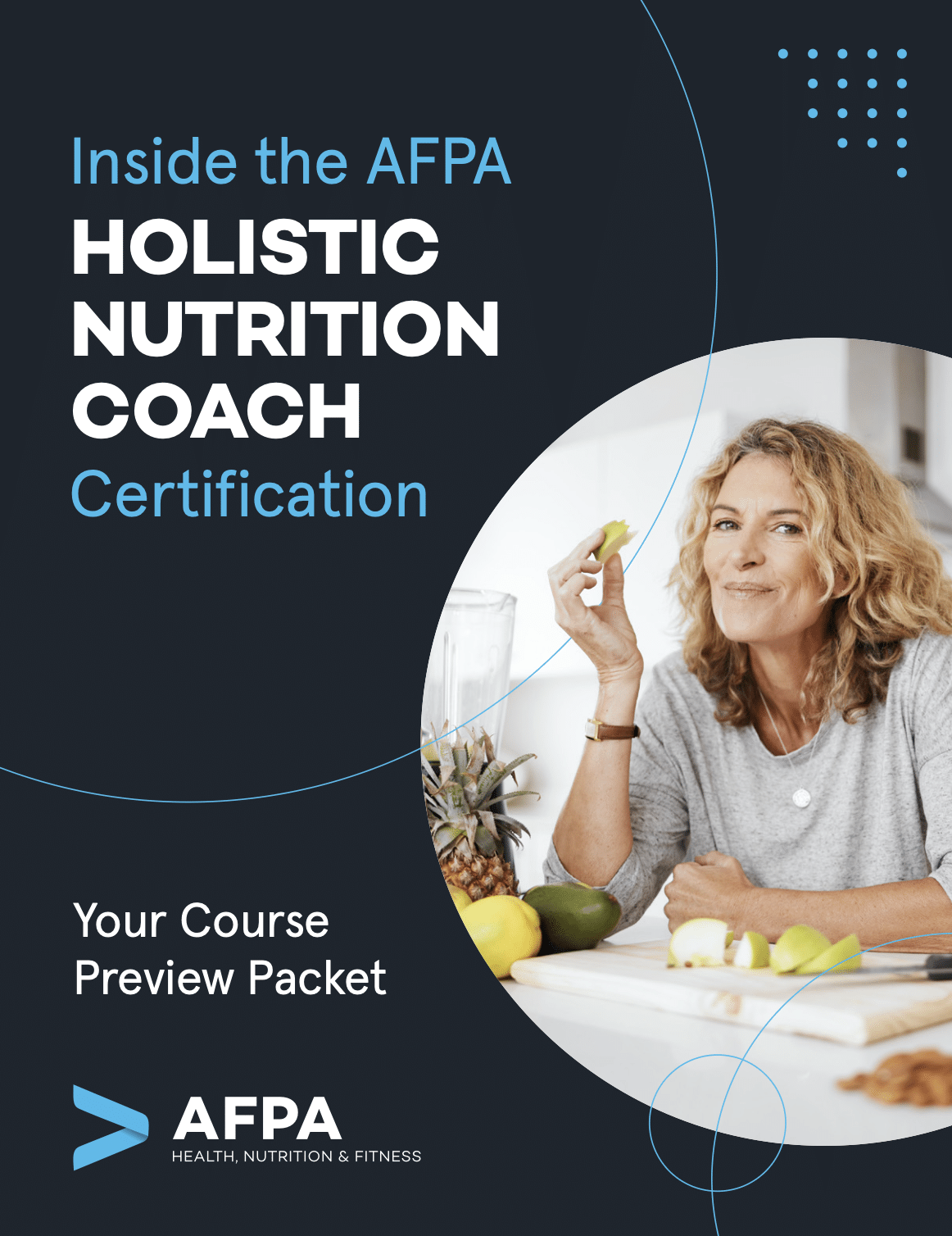We live in the information era, which gives health professionals of today a huge advantage over those from a few decades ago.
At the same time, the constant flow of information can be overwhelming and confusing. You may be concerned about:
- Whether the information is backed by science
- If the information modifies previous guidelines
- Who to trust to provide you with new information
- If the information is up-to-date
As health and wellness coaches, staying up-to-date with the latest health, nutrition, wellness, and fitness research and guidelines is essential to your clients’ wellbeing and the success of your business.
Navigating that information can be a challenge, so here are ten tips that you can pick and choose from for keeping your health and wellness knowledge up-to-date.


Take a Peek Inside AFPA’s Holistic Nutrition Coach Certification
Curious what it’s really like to study holistic nutrition at a professional level? Get the free course preview and see the actual learning modules, frameworks, and real-world coaching applications that prepare AFPA graduates for success.
10 Tips for Keeping your Health and Wellness Knowledge Up-to-Date
Keeping your health and wellness knowledge up-to-date is a constant need. Health and wellness coaches who don’t stay curious or conform to the knowledge they learned when they earned their certification and degree might not only miss the opportunity to make a better, greater impact in their clients’ lives but also their business may suffer if their information and strategies are outdated.
Here, AFPA has shared some tips for how you can stay up-to-date with the latest information as part of your regular routine.
Set up Google Alerts
Best for: Trends
You can set up Google alerts to automatically receive the latest news, trends, and information on a range of topics from health, nutrition, wellness, and coaching. If your services focus on gut health, you can set up a Google alert with that term. You can also specify whether you want to receive only news alerts, discussion boards, or blog articles or if you want to receive whatever is trending on the web.
Keep in mind that while Google’s search algorithm will always try and select the best-quality information, you are still going to have to use a critical eye to establish how credible the information is.
Some search terms you may want to set up alerts for are:
- Nutrition studies
- Wellness
- Immune health
- Health coaching
- Behavior change
- Positive psychology
- Exercise techniques
- Coaching business
Join a Professional Association
Best for: Building your network
Once you’ve received your credential, it’s time to join a professional association and really dive into the world of professional health, nutrition, fitness, and coaching. Perks vary depending on the association, but they may include free access to studies and high-quality information, discounts on continued education, and being listed in their directory.
Some examples include:
- The National Board of Health and Wellness Coaching
- Health Coach Alliance
- American Council on Exercise
- American Running Association
- Society of Health and Physical Educators (SHAPE)
- National Athletic Trainers Association
Sign up for Authority Newsletters
Best for: Regulations and authority opinions
Authority organizations and associations are made up of dozens, or even hundreds, of professionals within a particular field. They are expertly trained to review the research, and they have important panels and discussions about the research. In some cases, authority organizations have the power to influence, or even implement, regulations.
There are two general types of authority organizations:
Associations and organizations: They are comprised of panels of experts and professionals in certain fields or on a specific topic. They are usually called to inform public policy and clinical guidelines. They often publish position papers and recommend strategies. Some associations and organizations you may want to follow include:
- American Nutrition Association
- American Academy of Nutrition and Dietetics
- American College of Sports Medicine
- American Holistic Health Association
- British Association for Holistic Medicine & Health Care
- American Heart Association
- World Public Health Nutrition Association
- American Diabetes Association
- American Psychological Association
- Institute for Functional Medicine
- American Academy for Anti Aging Medicine
- Academy of Integrative Health and Medicine
- American Public Health Association
- Environmental Working Group
Government entities: They are responsible for the official guidelines and regulations and are often informed by the associations above and others. Keep in mind that it may take several years for regulations to be updated with the most recent knowledge.
- US Department of Agriculture (USDA): Nutrition, food, and agriculture guidelines, policy, and public health recommendations.
- ChooseMyPlate: The nutrition division of the USDA.
- US Food and Drug Administration (FDA): Information on food, supplements, and drugs.
- Center for Disease Control and Prevention (CDC): Information on chronic and acute diseases, their symptoms, diagnosis, and treatment. Also includes general lifestyle guidelines.
- World Health Organization (WHO): The ultimate resource for global trends, guidelines, research, situation updates, and scam alerts. Many countries base their national guidelines off of the WHO’s guidelines.
Expert tip: We don’t recommend that you follow all of these authority groups, as that could lead to an overload of information. Pick and choose the ones that are most relevant to the work you do. They may not even be on this list!
Attend Webinars
Best for: Quick knowledge refreshers
As you begin to get a sense of who your go-to-sources are for information, keep an eye out for events they may be hosting. Online events, conferences, and webinars are a great way to hear about the latest research and trends from the experts themselves and engage with them to ask questions.
Once the webinar is over, we recommend that you use the webinar network to stay engaged and continue to learn after the event is over.
Complete Continued Education Courses
Best for: Refreshing or updating your knowledge
AFPA and other associations offer short courses to allow health professionals and coaches to continue their education and keep up-to-date. During these courses you can:
- Refresh your knowledge on a subject you have not yet put into practice
- Be informed about the most up-to-date guidelines and recommendations for lifestyle, exercise, or specific health conditions
- Get questions answered from experts in your niche
- Add value to your coaching business
- Learn how to connect your knowledge with how you work with clients
Continued education courses vary in length. Some last only a week, while others may last several months.
Subscribe to Study Alerts
Best for: Staying informed about groundbreaking research and study trends
There are websites that are dedicated to identifying up-to-date research from hundreds of journals, summarizing them, and sending them to your inbox. You can choose the topics of your interest and have alerts sent to your inbox daily or weekly.
Some examples include:
- Science Daily
- Science Direct
- Nature.com
- News Medical Life Sciences
- Medical News Today
- Healthline
- Examine
Remember to be critical of the studies you read. Take a look at study size and methods, and consider whether the study results have been confirmed in previous studies.
Follow Expert Social Media Accounts
Best for: Trends and getting tidbits of authority information
Experts may include individuals, key opinion leaders, researchers and policymakers or the social media accounts for the associations and organizations mentioned above.
Remember that social media posts are based on larger documents, sources, and resources. If you come across information that is pertinent to your coaching practice, remember to dig deeper. Click on the link to learn more, and read the source document critically or ask the key opinion leader if they can recommend a place to read more on the subject.
Read Books
Best for: Diving into specific subjects
If you’ve completed AFPA’s certification or another health and wellness certification, you know how essential reading is to getting you to think, open your mind to new information, and really dive into a subject.
Aim to make reading about a subject that interests you part of your daily routine, even if it is just a few pages at a time.
If you’re always on the move, consider trying out audiobooks!
Listen to Podcasts
Best for: Listening to diverse opinions
Whether it’s driving to your next appointment, working out, or doing chores around the house, listening to health and nutrition-related podcasts is a great way to engage your mind and listen to experts have conversations with each other and analyze and deconstruct trends.
Subscribe to Journals
Best for: Learning about newly published studies
If you find yourself regularly linking back to the same journal over and over to read an original study, you may benefit from subscribing to specific journals. You can choose to only receive newsletters or purchase a subscription and gain access to full-length original articles.
There are too many relevant scientific journals to list, but you can browse the Directory of Open Access Journals for some ideas.
Important: Don’t Fall into the Misinformation Trap
- Be aware of your biases. Avoid automatically accepting research and information that confirms your beliefs or disregarding research that challenges your beliefs.
- Be critical of all information you read. Ask yourself where the information is coming from and whether sources are cited.
- Block out the noise. Unfollow social media accounts that perpetuate false, skewed, or unverified information.
- Ask all the questions. Take a deeper look at whether the study was well-designed (randomized control trials, meta-analysis, systematic reviews, published in peer-reviewed journals).



